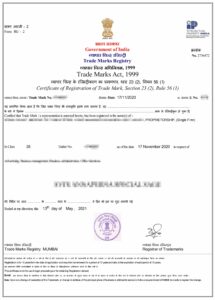
Trademark Renewal Process in India
Table of Contents
ToggleTrademark Renewal Process : Overview
In the dynamic landscape of business, trademarks play a pivotal role in establishing brand identity and protecting intellectual property. In India, the process of trademark registration is crucial, but equally important is the renewal process to ensure the perpetual safeguarding of your brand.
This blog aims to demystify the trademark renewal process in India, offering a comprehensive guide for businesses and individuals alike.
What is Trademark Renewal ?
A trademark in India is initially registered for a period of 10 years. However, to maintain the exclusivity and protection offered by a trademark, it is imperative to renew it before the expiration of this term. The renewal process is essential for businesses to continue enjoying the legal benefits associated with trademark ownership.
Key Steps in the Trademark Renewal Process
- Determine Renewal Eligibility:
Before initiating the renewal process, it’s crucial to ensure that the trademark is eligible for renewal. Trademarks that are not renewed within the stipulated timeframe may be subject to removal from the register.
- Timely Application:
The renewal application must be filed well in advance, preferably six months before the expiry of the trademark registration. This proactive approach helps avoid any potential lapses in protection.
- Verification of Trademark Details:
During the renewal process, it’s essential to verify and update any changes in the trademark details, including the owner’s name, address, and the goods or services covered by the trademark.
- Payment of Renewal Fees:
A prescribed renewal fee must be paid to the Registrar of Trademarks. The amount varies depending on the type of entity (individual, small enterprise, or large enterprise) and the mode of filing (online or offline).
- Document Submission:
Along with the renewal application and fee, relevant documents must be submitted to the Registrar. These documents may include a Power of Attorney (if applicable), proof of use of the trademark, and any other supporting documents as required.
- Examination by the Registrar:
Once the renewal application is submitted, the Registrar examines the application to ensure compliance with the statutory requirements. Any discrepancies or issues may be communicated to the applicant for rectification.
- Issuance of Renewal Certificate:
Upon successful examination and completion of formalities, the Registrar issues a renewal certificate. This certificate serves as evidence of the renewed trademark registration.
- Publication in the Trademark Journal:
The renewal of a trademark is typically published in the Trademark Journal. This public notification allows interested parties to raise objections within a specified period.
Documents Required for Trademark Registration Renewal Online India
Here is a general list of documents that were typically required for trademark renewal in India:
- Trademark Renewal Application Form:
The application form for trademark renewal needs to be filled out accurately. In India, the form used for renewal is usually TM-R.
- Power of Attorney (if applicable):
If the renewal is being filed through a trademark agent or attorney, a Power of Attorney authorizing them to act on behalf of the trademark owner may be required.
- Details of the Registered Trademark:
Comprehensive information about the registered trademark, including the registration number, class of goods or services, and details of the current registration.
- Proof of Use:
In some cases, the Registrar may request proof of use of the trademark in connection with the registered goods or services. This could include invoices, product packaging, or any other evidence of the trademark being actively used in the marketplace.
- Updated Owner Information
If there have been any changes in the ownership details (name, address, etc.) since the initial registration, updated information should be provided.
- Government Fee Receipt:
Evidence of payment of the prescribed renewal fee should be included. The fee amount may vary depending on the type of entity and the mode of filing (online or offline).
Trademark Renewal fees in India
As a general guideline, the renewal fees for a trademark in India can vary. Here is a rough estimate based on the applicant type:
Individuals, Start-ups, and Small Enterprises:
Online Filing: Approximately INR 1500 +govt fees
Large Enterprises:
Online Filing: Approximately INR 2500 + govt . fees
How Legalution Helps With The Process Of Trademark Renewal
Expert Guidance:
Legalution brings a wealth of expertise in intellectual property law to the table. Their team of seasoned professionals understands the nuances of trademark renewal, providing clients with valuable insights and guidance throughout the process.
Document Preparation and Submission:
Preparing and submitting the necessary documentation is a critical step in the renewal process. Our services include comprehensive assistance in compiling and submitting the required paperwork, ensuring accuracy and adherence to legal requirements.
Timely Reminders:
Missing a trademark renewal deadline can have significant consequences. Our services include timely reminders, ensuring that clients are well-informed about upcoming renewal dates. This proactive approach allows businesses to take necessary actions well in advance.
Efficient Online Filing:
Streamlining the renewal process is a key feature of our services. By providing an online platform for filing trademark renewals, clients can conveniently submit applications, make payments, and track the status of their renewals in real-time.
Intermediary for Communications:
Dealing with the Trademark Registry or relevant authorities can be intricate. Legalution may act as a crucial intermediary, handling communications with authorities and addressing any queries or concerns that arise during the examination process.
Comprehensive Monitoring:
In addition to renewal services, We offer trademark monitoring to keep clients informed about changes in the legal landscape that could impact their registered trademarks. This includes monitoring for potential conflicts, objections, or legislative changes.
Conclusion
In conclusion, the trademark renewal process in India is a crucial aspect of maintaining the exclusivity and protection granted by trademark registration. Businesses and individuals must be vigilant and proactive in ensuring timely renewals to avoid any legal and operational consequences.
By understanding the key steps involved, stakeholders can navigate the process with confidence, safeguarding their valuable intellectual property assets for years to come.




